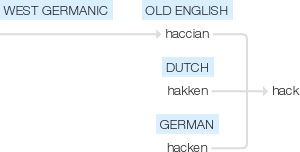Hack
Old English haccian ‘cut in pieces’, of West Germanic origin; related to Dutch hakken and German hacken .
wiktionary
From Middle English hacken, hakken, from Old English haccian(“to hack”), from Proto-Germanic *hakkōną(“to chop; hoe; hew”), from Proto-Indo-European *keg-, *keng-(“to be sharp; peg; hook; handle”).
Cognate with Saterland Frisian häkje(“to hack”), West Frisian hakje(“to hack”), Dutch hakken(“to chop up; hack”), German hacken(“to chop; hack; hoe”), Danish hakke(“to chop”), Swedish hacka(“to hack; chop”), French hacher(“to chop”).
The computer senses date back to at least 1955 when it initially referred to creative problem solving. By 1963, the negative connotations of “ black hat” or malicious hacking had become associated with telephone hacking (cf. phreaking). [1]
Variations of hatch, heck.
Abbreviation of hackney(“an ordinary horse”), probably from place name Hackney.
From hackysack
etymonline
hack (v.1)
"to cut roughly, cut with chopping blows," c. 1200, from verb found in stem of Old English tohaccian "hack to pieces," from West Germanic *hakkon (source also of Old Frisian hackia "to chop or hack," Dutch hakken, Old High German hacchon, German hacken), from PIE root *keg- "hook, tooth."
Perhaps influenced by Old Norse höggva "to hew, cut, strike, smite" (which is unrelated, from PIE *kau- "to hew, strike;" see hew). Slang sense of "cope with" (as in can't hack it) is first recorded in American English 1955, with a sense of "get through by some effort," as a jungle (phrase hack after "keep working away at" is attested from late 14c.). To hack around "waste time" is U.S. slang, by 1955, perhaps originally of golfers or cabbies. Related: Hacked; hacking.
hack (n.1)
"tool for chopping," early 14c., from hack (v.1); cognates: Danish hakke "mattock," German Hacke "pickax, hatchet, hoe." Meaning "a cut, notch" is from 1570s. Meaning "an act of cutting" is from 1836; figurative sense of "a try, an attempt" is first attested 1898.
hack (n.2)
"person hired to do routine work," c. 1700, ultimately short for hackney "an ordinary horse, horse for general service (especially for driving or riding, as opposed to war, hunting, or hauling)," c. 1300. This word is probably from the place name Hackney, Middlesex. Apparently nags were raised on the pastureland there in early medieval times. Extended sense of "horse for hire" (late 14c.) led naturally to "broken-down nag," and also "prostitute" (1570s) and "a drudge" (1540s), especially a literary one, one who writes according to direction or demand. Sense of "carriage for hire" (1704) led to modern slang for "taxicab." As an adjective, 1734, from the noun. Hack writer is first recorded 1826, though hackney writer is at least 50 years earlier. Hack-work is recorded from 1851.
HACK. A hackney coach. The term hack is also frequently applied by women to any article of dress, as a bonnet, shawl, &c., which is kept for every day use. [Bartlett, "Dictionary of Americanisms," 1848]
hack (v.2)
"illegally enter a computer system," by 1984; apparently a back-formation from hacker. Related: Hacked; hacking (1975 in this sense). Earlier verb senses were "to make commonplace" (1745), "make common by everyday use" (1590s), "use (a horse) for ordinary riding" (1560s), all from hack (n.2).
hack (v.3)
"to cough with a short, dry cough," 1802, perhaps from hack (v.1) on the notion of being done with difficulty, or else imitative.
hack (adj.)
"hired, mercenary," 1812, from hack (n.2).
hack (n.3)
"a short, hard cough," 1885, from hack (v.3).
